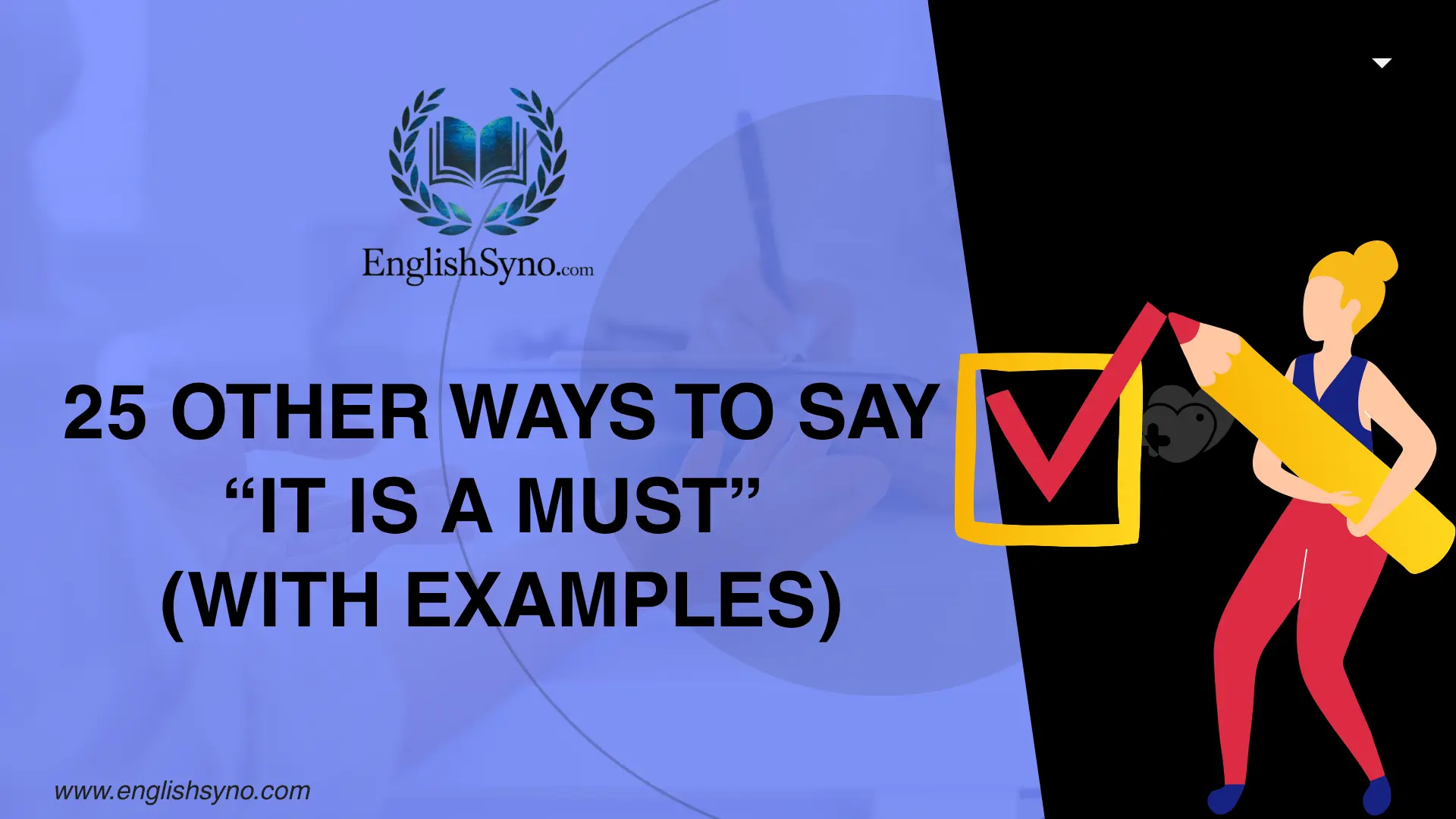In my experience, it is a must to understand that the idiomatic phrase emphasizes something essential, required, and highly recommended, which should not be missed or ignored, as seeing a new exhibit at a museum or visiting a place becomes a necessity rather than just a casual choice, and the word “must” can act as a verb, auxiliary, or noun representing an action or object that is necessary or needed, helping maintain clarity and purpose in sentences.
While scrolling through emails, social media, or product reviews, people sometimes use the phrase interchangeably, which can confuse the difference between casual and formal usage, and knowing how it functions in English – as a modal, noun, or grammatically correct article – makes a big difference. Curating website content for a brand blog post, I explained language quirky nuances, and following core rules in formal professional writing can elevate a single important, subtle distinction, while real examples, clear tools, and tips help remember structure, get a strong message, naturally improve communication, do something to keep school or work clean, because accepted or slightly mistaken phrasing affects how your expression plays a role in writing and speaking.
What Does “it is a must” Mean?
The phrase “it is a must” means that something is essential, required, or highly recommended – it shouldn’t be missed or ignored. In other words, it expresses necessity rather than a casual choice, like saying visiting a famous museum or seeing a new exhibit is something you must do.
When to Use “it is a must”
Use “it is a must” when emphasizing something important, necessary, or strongly advised. Ideal in professional contexts, personal recommendations, or travel and event suggestions. Avoid overuse to prevent tone from feeling overly commanding.
Is It Professional/Polite to say “it is a must”?
Yes, it is generally professional and polite, but tone matters. Pairing it with context, examples, or reasoning softens the phrase and makes it approachable, rather than dictatorial.
Pros or Cons
Pros:
- Clearly emphasizes importance
- Short, direct, and universally understood
Cons:
- Can feel slightly commanding if overused
- May lack nuance in delicate contexts
Absolutely essential
Meaning & Definition: Something that is extremely necessary or indispensable.
Detailed Explanation: This phrase conveys urgency with strong emphasis, signaling that skipping it is not an option.
Best Use: Formal recommendations, critical instructions, or key steps in a process.
Worst Use: Casual conversation where softer phrasing is preferred.
Tone: Firm, serious, confident
Example: Attending the safety briefing is absolutely essential for all new employees.
Highly recommended
Meaning & Definition: Strongly advised based on experience or judgment.
Detailed Explanation: Implies a strong suggestion rather than an obligation, making it approachable.
Best Use: Travel guides, product reviews, professional advice.
Worst Use: Legal or mandatory instructions.
Tone: Friendly, advisory
Example: This book is highly recommended for anyone learning digital marketing.
Strongly advised
Meaning & Definition: Suggested with emphasis to prevent potential issues.
Detailed Explanation: Carries authority while remaining courteous, emphasizing potential consequences.
Best Use: Health, safety, or professional guidance.
Worst Use: Over casual, informal conversations.
Tone: Serious, professional
Example: It is strongly advised to back up your data before updating the software.
A must-do
Meaning & Definition: An activity or task that should not be missed.
Detailed Explanation: Informal phrase suitable for casual recommendations or personal experiences.
Best Use: Travel tips, entertainment suggestions.
Worst Use: Highly formal documents.
Tone: Casual, friendly
Example: Visiting the Eiffel Tower is a must-do when in Paris.
Critical
Meaning & Definition: Of high importance or essential for success.
Detailed Explanation: Highlights the potential impact or risk if not followed or completed.
Best Use: Work processes, project management, safety instructions.
Worst Use: Lighthearted social recommendations.
Tone: Serious, urgent
Example: Checking the emergency exits is critical before starting the tour.
Indispensable
Meaning & Definition: Necessary; cannot be replaced or omitted.
Detailed Explanation: Suggests that omission will compromise outcome or effectiveness.
Best Use: Business tools, education materials, essential resources.
Worst Use: Casual advice among friends.
Tone: Formal, assertive
Example: A reliable internet connection is indispensable for remote work.
Necessary
Meaning & Definition: Required for a particular purpose or goal.
Detailed Explanation: Neutral term suitable for professional or casual contexts.
Best Use: Instructions, procedural guides.
Worst Use: Overused in persuasive writing without added reasoning.
Tone: Neutral, factual
Example: It is necessary to submit all forms by Friday.
Essential
Meaning & Definition: Fundamental, very important, or vital.
Detailed Explanation: Highlights the importance of achieving an objective or outcome.
Best Use: Key points in presentations, training, and advice.
Worst Use: Overstated in trivial matters.
Tone: Serious, professional
Example: Good communication skills are essential for team success.
Imperative
Meaning & Definition: Crucial; requires immediate attention or action.
Detailed Explanation: Strong, commanding term that emphasizes urgency.
Best Use: Safety alerts, compliance directives.
Worst Use: Casual recommendations, personal suggestions.
Tone: Authoritative, urgent
Example: It is imperative to read the safety manual before operating machinery.
Cannot be overlooked
Meaning & Definition: Must not be ignored; highly significant.
Detailed Explanation: Highlights the importance without sounding too rigid.
Best Use: Important considerations, deadlines, or tasks.
Worst Use: Light, informal suggestions.
Tone: Serious, advisory
Example: The final exam schedule cannot be overlooked by students.
Obligatory
Meaning & Definition: Required by rules, law, or moral duty.
Detailed Explanation: Formal, often used in compliance or legal contexts.
Best Use: Policy manuals, official communications.
Worst Use: Casual speech or informal advice.
Tone: Formal, strict
Example: Wearing a helmet is obligatory on this construction site.
Must-have
Meaning & Definition: Essential item or feature.
Detailed Explanation: Commonly used for products, gadgets, or experiences highly recommended.
Best Use: Marketing, shopping guides, lifestyle blogs.
Worst Use: Formal policy documents.
Tone: Casual, enthusiastic
Example: A portable charger is a must-have for travelers.
Vital
Meaning & Definition: Necessary for life, success, or proper function.
Detailed Explanation: Strong emphasis on importance with positive energy.
Best Use: Health, projects, key skills.
Worst Use: Minor or trivial items.
Tone: Serious, positive
Example: Daily exercise is vital for maintaining good health.
Required
Meaning & Definition: Compulsory, needed to fulfill a condition or expectation.
Detailed Explanation: Direct and factual, indicating obligation.
Best Use: Work instructions, forms, submissions.
Worst Use: Optional Suggestions.
Tone: Neutral, professional
Example: All employees are required to attend the training session.
Unavoidable
Meaning & Definition: Cannot be ignored or bypassed.
Detailed Explanation: Implies inevitability; skipping could lead to negative outcomes.
Best Use: Warnings, deadlines, safety instructions.
Worst Use: Lighthearted or casual tips.
Tone: Serious, cautionary
Example: Checking the engine oil is unavoidable before a long drive.
Recommended
Meaning & Definition: Suggested based on judgment or experience.
Detailed Explanation: Softer alternative that feels friendly and helpful.
Best Use: Reviews, advice, guidance.
Worst Use: Situations requiring strict enforcement.
Tone: Friendly, advisory
Example: It is recommended to drink plenty of water during hot weather.
Urgent
Meaning & Definition: Requiring immediate attention or action.
Detailed Explanation: Highlights priority, often with potential consequences.
Best Use: Health, work deadlines, emergency instructions.
Worst Use: Casual social advice.
Tone: Serious, pressing
Example: Submitting your tax forms is urgent before the deadline.
Compulsory
Meaning & Definition: Mandated; cannot be opted out of.
Detailed Explanation: Formal, often legal or institutional context.
Best Use: School or workplace rules.
Worst Use: Informal advice.
Tone: Formal, authoritative
Example: Wearing an ID badge is compulsory at all times.
Important
Meaning & Definition: Significant or of high priority.
Detailed Explanation: Neutral term to emphasize relevance or value.
Best Use: General advice, communication, educational contexts.
Worst Use: Overuse diminishes emphasis.
Tone: Neutral, factual
Example: It is important to read the instructions carefully.
Imperative to consider
Meaning & Definition: Must be carefully thought about; necessary.
Detailed Explanation: Emphasizes thoughtfulness and necessity.
Best Use: Planning, decision-making contexts.
Worst Use: Casual chat or minor suggestions.
Tone: Serious, reflective
Example: It is imperative to consider all options before signing a contract.
Essential requirement
Meaning & Definition: Non-negotiable condition or need.
Detailed Explanation: Combines strong importance with formal tone.
Best Use: Official instructions, job descriptions.
Worst Use: Casual advice.
Tone: Formal, factual
Example: Punctuality is an essential requirement for this internship.
Cannot be missed
Meaning & Definition: Should not be ignored or skipped.
Detailed Explanation: Emphasizes opportunity or critical importance.
Best Use: Events, travel, experiences.
Worst Use: Mundane tasks.
Tone: Enthusiastic, persuasive
Example: The concert cannot be missed if you love jazz music.
Urgently needed
Meaning & Definition: Required immediately.
Detailed Explanation: Highlights time-sensitive importance.
Best Use: Emergency requests, project deadlines.
Worst Use: Everyday casual suggestions.
Tone: Serious, pressing
Example: Volunteers are urgently needed for the charity drive.
Core necessity
Meaning & Definition: Central, fundamental requirement.
Detailed Explanation: Indicates foundational importance to a process or goal.
Best Use: Education, project essentials, planning.
Worst Use: Minor recommendations.
Tone: Serious, foundational
Example: Critical thinking is a core necessity for problem-solving.
Non-negotiable
Meaning & Definition: Cannot be waived or ignored.
Detailed Explanation: Highlights absolute importance, leaving no room for optionality.
Best Use: Policies, rules, mandatory practices.
Worst Use: Optional advice or casual situations.
Tone: Firm, authoritative
Example: Employee confidentiality is non-negotiable in this company.
Final Thoughts
Finding the right way to say “it is a must” can significantly improve how your message is received. The phrases explored in this article, from essential to non-negotiable, offer readers a spectrum of choices to communicate importance, urgency, and necessity with clarity and warmth. Using these alternatives thoughtfully ensures that your communication feels considerate and professional rather than rigid or commanding. In professional, social, or personal contexts, selecting the appropriate phrase allows you to balance authority, empathy, and tone. For example, while “imperative” conveys urgency, “highly recommended” provides a softer, friendlier approach. Recognizing the context is key: formal settings often require phrases like critical, compulsory, or essential requirement, whereas casual conversations or social media might benefit from a must-do, must-have, or cannot be missed.
Additionally, understanding the nuances of these phrases prevents miscommunication. Using a phrase in the wrong tone can make a message feel pushy, while the correct choice can inspire action, guide decisions, or highlight important points effectively. The ultimate goal is clear communication that motivates, informs, or guides without causing misunderstanding. By practicing and applying these alternatives, you gain flexibility in your writing and speech, allowing your words to resonate authentically with readers, colleagues, or audiences. Always consider context, tone, and audience to ensure your phrasing is both effective and empathetic.
FAQs
What does “it is a must” mean?
“It is a must” indicates something is essential, required, or highly recommended. It signals that an action or item should not be ignored.
Can I use “it is a must” in professional emails?
Yes, it can be professional if used carefully. Pair it with reasoning or examples to keep the tone polite and clear.
What is the difference between “essential” and “it is a must”?
“Essential” highlights importance, while “it is a must” emphasizes necessity. Both convey urgency but differ slightly in tone.
Is “must-have” informal?
Yes, “must-have” is casual and commonly used in marketing, lifestyle, or personal recommendations, rather than formal contexts.
How can I make “it is a must” sound softer?
Use alternatives like highly recommended or strongly advised to convey importance without sounding commanding.
Can “it is a must” be overused?
Yes, overusing it can sound rigid or pushy. Vary your phrasing based on context and audience.
Is “imperative” the same as “it is a must”?
Similar, but “imperative” is stronger and more formal, often conveying urgency or necessity in professional or serious contexts.
Can I use it in casual conversations?
Yes, casual alternatives include a must-do, cannot be missed, or must-have for everyday suggestions or advice.
Why is context important when using these phrases?
Context ensures your phrasing matches tone, audience, and purpose, preventing miscommunication or sounding overly forceful.
What is a good alternative for school-related instructions?
Use required, essential, or critical, which convey importance clearly in educational settings.
Are all alternatives formal?
No, some are casual (a must-do, must-have) while others are formal (imperative, non-negotiable), allowing flexibility.
Can these phrases motivate action?
Yes, using the right phrase can guide decisions, highlight priorities, and encourage immediate action effectively.
Is “strongly advised” softer than “imperative”?
Yes, “strongly advised” is authoritative yet polite, while “imperative” is commanding and urgent.
Are these phrases interchangeable?
They can be, but subtle differences in tone, formality, and context determine which fits best.
How can I practice using these phrases effectively?
Incorporate them in emails, reports, social posts, and conversations. Reflect on audience response and adjust tone for clarity and empathy.

Muhammad Altaf is an English language specialist and professional content strategist with over 10 years of experience writing and teaching practical English usage, professional communication, and tone awareness. His work focuses on helping readers express ideas clearly, naturally, and confidently in real-world contexts.


